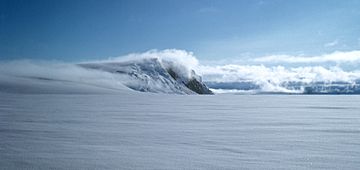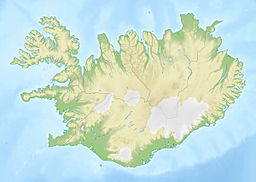Grímsvötn facts for kids
Quick facts for kids Grímsvötn |
|
|---|---|

Grímsvötn and the Vatnajökull glacier, Iceland, July 1972
|
|
| Highest point | |
| Elevation | 1,725 m (5,659 ft) |
| Listing | List of volcanoes in Iceland |
| Geography | |
| Geology | |
| Mountain type | Volcanic caldera |
| Last eruption | May 2011 |
Grímsvötn is a very active volcano located in southeast Iceland. It stands tall at about 1,725 meters (5,659 feet) high. This volcano is known for erupting more often than any other volcano in Iceland!
Grímsvötn is a type of volcano called a basaltic volcano. This means its lava is thin and flows easily. It also has a long crack in the ground, called a fissure system. This crack runs from the southwest to the northeast. A huge eruption called Laki happened in 1783–1784. That eruption was actually part of the same fissure system as Grímsvötn!
Contents
About Grímsvötn's Eruptions
Grímsvötn is a caldera, which is a large bowl-shaped hollow. It forms when the ground collapses after a big eruption. Most of the volcano is hidden under the huge Vatnajökull glacier. This means that when Grímsvötn erupts, the heat melts a lot of ice. This melting ice can cause big floods called jökulhlaups.
Frequent Activity
Grímsvötn is the most active volcano in Iceland. It erupts very often, usually every 5 to 10 years. Its eruptions are often small to medium-sized. They mostly affect the area around the volcano. However, some eruptions can be much larger.
The last time Grímsvötn erupted was in May 2011. This eruption sent a large ash cloud high into the sky. It caused some disruption to air travel in parts of Europe.
The Laki Fissure Eruption
The Laki eruption of 1783–1784 was one of the biggest eruptions in history. It was part of the same crack system as Grímsvötn. This eruption released huge amounts of sulfur dioxide gas. This gas caused a thick haze across Europe. It led to very cold winters and hot summers. This affected crops and caused many problems for people.
See also
 In Spanish: Grímsvötn para niños
In Spanish: Grímsvötn para niños
Images for kids
 | Precious Adams |
 | Lauren Anderson |
 | Janet Collins |







